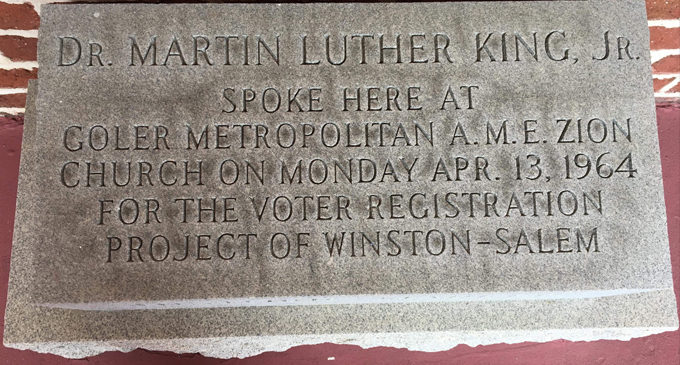A day with the King: A look back at Dr. King’s visit to Winston-Salem
A marker outside Goler Metropolitan AME Zion Church commemorates April 13, 1964, the day Dr. Martin Luther King Jr. spoke at the church located on E. 4th Street.

While the date probably won’t show up in any history books, civil rights museums, or your favorite search engine, for the thousands of people who were able to witness the scene at Goler Metropolitan AME Zion Church, April 13, 1964, is a day they will never forget. On that day, just a year after his famous “I Have a Dream” speech, Dr. Martin Luther King Jr. stopped in Winston-Salem to galvanize voters.
More than 1,000 made it inside the church located on East Fourth Street, while thousands more camped outside to just get a glimpse of the civil rights icon. The focus of King’s speech was the importance of voting, but according to old newspaper clippings, those in attendance recalled Dr. King discussing the need to keep protests peaceful, what freedom really means, and racial injustice.
One of the people who managed to find a seat inside was community activist Velma Hopkins. In 1943 Hopkins helped organize a strike against R.J. Reynolds Tobacco Company, which drew a crowd of more than 10,000 people and led to the founding of the only union to be formed by Reynolds employees.
When discussing King’s visit with The Chronicle in 1993, three years before she died, Hopkins said what she remembers most is how humble Dr. King was.
“I remember he was a down-to-earth man. And he kept everyone’s feet in the grass. He wasn’t a man who was big on I’s and little on U’s,” Hopkins continued. “I think Dr. King did a beautiful job. He was a God-sent man. And whatever happened, he will always be Dr. Martin Luther King.”
Tagging along with Hopkins that day was Earline Parmon. Parmon, who would go on to serve on the Forsyth County Board of Commissioners and become the first African American woman in Forsyth County to be elected to the N.C. Senate, said when she heard Dr. King speak, she was inspired to do all she could to uplift her community. Parmon died in 2016 after a brief illness, but through her work and willingness to go above and beyond the call of duty, her legacy lives on.
“I remember thinking he was the next best thing to God. He was the ultimate person,” Parmon continued. “The impact was great on me … I had taken part in some of the marches and sit-ins since I was around 16 or 17 (years old), but this was the thing that really made me know what I wanted to do for my community. I had made up my mind.”
Rahman Wilson who was 14 at the time, said he remembers how excited people were on that day. Wilson said he had planned to attend, but when rumbles of a bomb threat began to surface, his mother, who was the local director of the Congress of Racial Equality, said he had to stay home. “Mom said we couldn’t go so all five of us had to stay at the house. We didn’t have a radio or anything like that, so we just waited until she got back,” Wilson said. Fortunately, the event went over without any issues and Wilson said he remembers how proud he was when his mother returned and gave them all the details.
“When you think about Winston-Salem was really on the map when it came to civil rights, but I felt like when Dr. King came, the spirit of the people really came alive,” Wilson said.
On Monday, Jan. 18, The Chronicle will host the 21st Annual Dr. Martin Luther King Jr. Prayer Breakfast. Because of the pandemic, the event will be held virtually. The event is scheduled to begin at 9 a.m. and can be viewed on The Chronicle’s Facebook page or the “WinstonSalem Chronicle” YouTube channel.
The Chronicle would like to share more stories from individuals who were in attendance during Dr. King’s visit to Goler Metropolitan AME Zion Church. If you were in attendance or have more information you would like to share please email name and contact information to tstinson@wschronicle.com.









